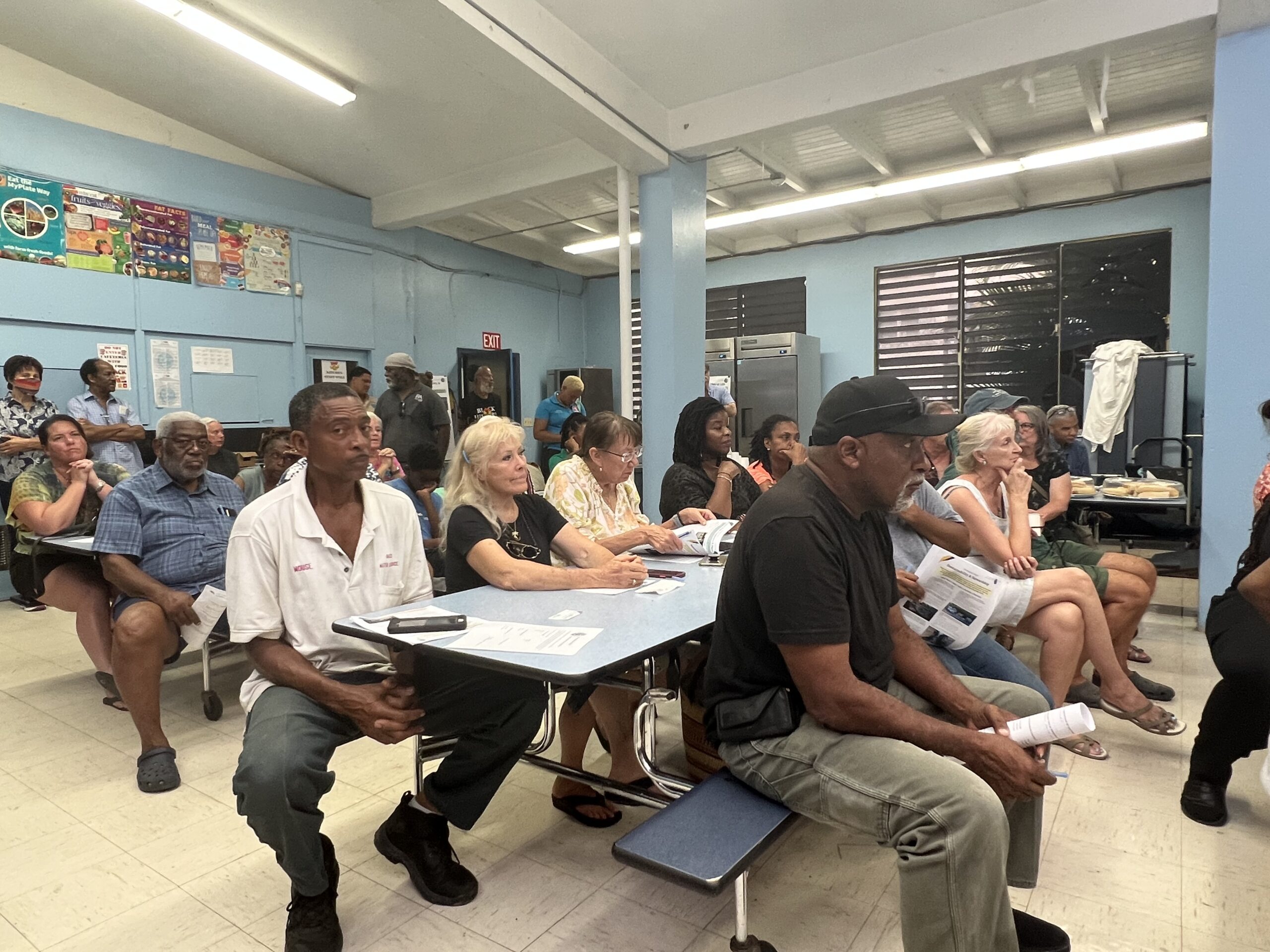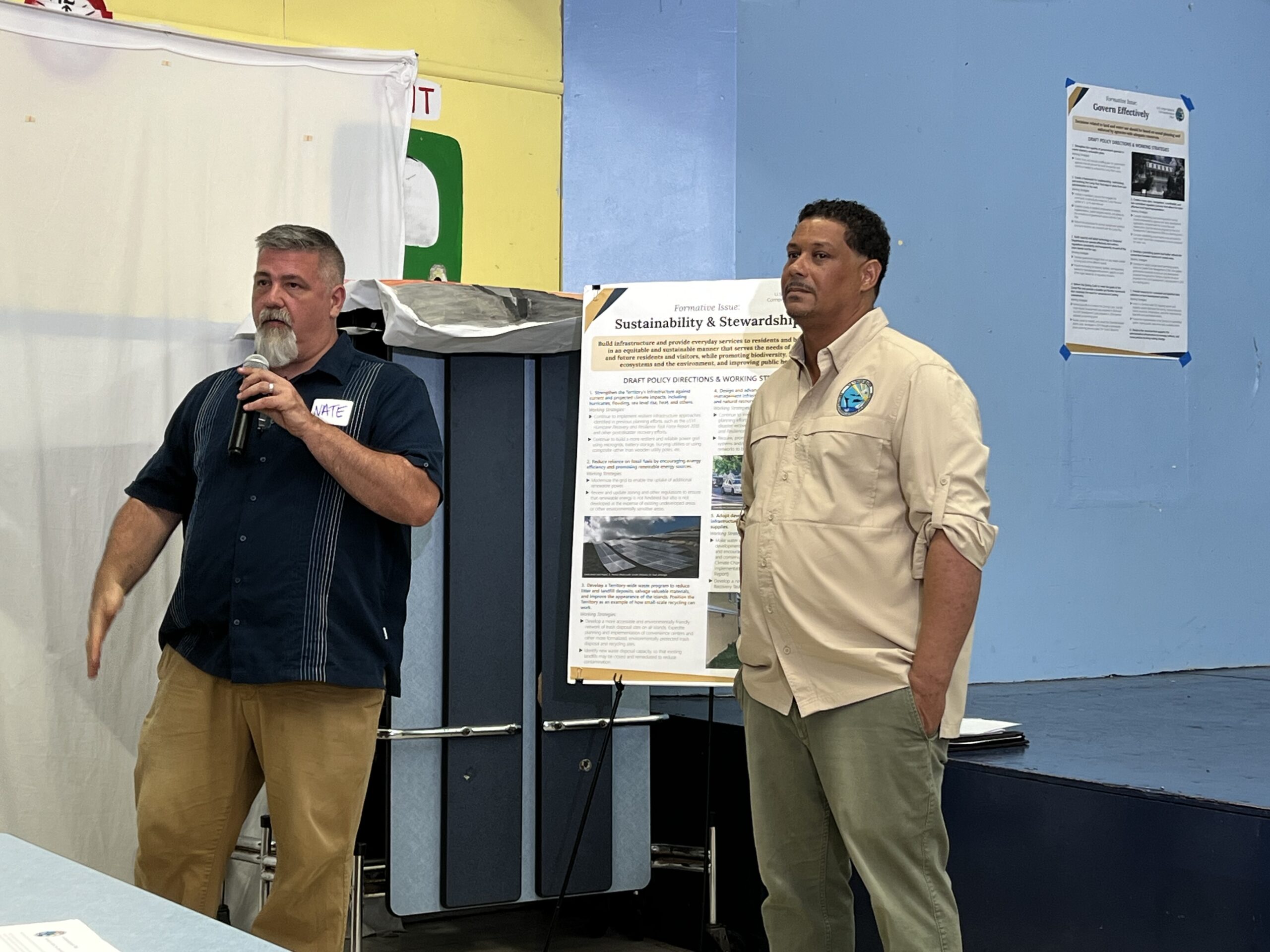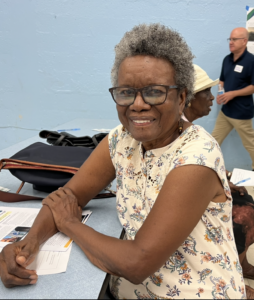Where should our government place new schools and health care facilities? How can we build more affordable housing? Where should development happen or not happen? And how should these decisions be made?
Several dozen residents of St. John came out Wednesday evening to hear the latest from officials and consultants working on a plan to create a framework to answer these questions.

The territory is now in its second round of public meetings to develop a Comprehensive Land and Water Use Plan, now called the Comp Plan, and residents are being asked to learn more and share their ideas by going to https://www.planusvi.com/get-involved.
During the previous round, community members asked that water use be made more prominent, according to Jeff Davis of the Horsley Witten Group, the consultants working with territorial officials on the plan.
Davis said there were also requests to focus more on cultural heritage as well as government transparency and accountability.
The challenge now for the government is to make sure all of their agencies are fully staffed and trained and have the resources to do their work and enforce regulations. “That is not the reality right now,” said Nate Kelly, principal planner with Horsley Witten.
During the first round on St. John, residents strongly expressed the need for more mechanisms for local decision-making, Davis said.
At Wednesday’s meeting, Nate Kelly said increasing local representation might require some government restructuring, which would be more complicated than integrating plans already developed for agriculture and transportation.

Residents spoke up about a number of issues, including the plan to build the Summers End Marina in Coral Bay, which was approved in 2020 but remains controversial.
When one resident asked for a show of hands of those who supported the marina, only one hand was raised, but Coral Bay resident Yvonne Wells spoke up and said this meeting was not the proper forum to debate the issue.
Wells also questioned how the shoreline in Cruz Bay could remain outside of the jurisdiction of Coastal Zone Management, the program that was established to manage, enhance, protect, and preserve the territory’s coastal resources.
Jean-Pierre “JP” Oriol, commissioner of the Department of Planning and Natural Resources, responded, “We know that politics played a role in it.”
Oriol said the drafting of the Comp Plan creates an opportunity for community members to tell their legislators whether it’s time to revise the Tier I and 2 designations now used by CZM.
Under the current law, construction projects built near shorelines are generally required to go through an extensive permitting process because they fall into an area designated as Tier 1, while construction projects further from the shoreline are designated as Tier 2 and go through far less scrutiny. Some areas, however, like Cruz Bay, were exempted from these designations.
Oriol said the law could be changed to make the entire island fall under Tier 1 designation, or the law could require every single major development to go through the process required for Tier 1 projects.
Former Senator Almando “Rocky’ Liburd asked whether the Comp Plan will contain zoning changes to allow for outcomes such as more affordable housing.
Kelly said, “The Comp Plan will contain recommendations for zoning reform, some will be general, some will be very specific. Drafting and adopting changes to zoning will occur after the Comp Plan is adopted by the Legislature.”
Some residents were concerned that suggestions made at a June Cruz Bay planning initiative might be too hastily incorporated into the Comp Plan.

Several people mentioned their opposition to suggestions made last month, including moving the passenger ferry terminal to the Enighed Pond and putting housing on the Winston Wells Ball Park in Cruz Bay once the modular classrooms for the Sprauve School are removed.
Following the meeting, Coral Bay resident Janet Burton said, “Change comes, and you can’t stop it, but I don’t want to see erasure of our culture.” She said closing the Guy Benjamin School contributes to the erasure of the legacy of its namesake, as would moving the ferry service named for Capt. Loredon Boynes Sr., and permanently closing the Winston Wells Ball Park.
Kisha Todman-Laurencin, a mother to two young boys, said she worries about congestion as the island’s population grows. She hopes that her children will be able to experience “the outdoor life” that she did when growing up – climbing trees, raising animals, growing fruits, and accessing the shorelines.

The Comp Plan was first presented to the public in February; the process is expected to take 18 months. “Ultimately, the USVI Legislature must approve and adopt the plan before it goes into effect,” according to the website.
.


